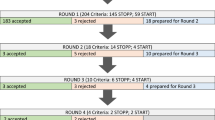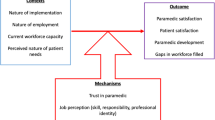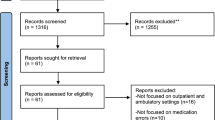Abstract
Objective To explore the opinions and knowledge of Australian pharmacists about impairment in the profession, and their awareness of new legislation regarding impairment and mandatory reporting. Setting Pharmacy practice in Australia. Method Pharmacists’ opinions and knowledge were explored using a purposively designed, de-identified survey distributed by an intermediate mailing house to randomly selected pharmacists registered with the Pharmacy Board. Descriptive statistics and thematic analyses were conducted on the data. Key Outcome Measures This being an explorative study, we analysed various items using standard statistical methods and qualitative thematic analysis for responses to open-ended questions. Results Responses from 370 registered pharmacists were obtained. Of these, nearly 60% were not confident in their knowledge of legislation relating to impairment. The vast majority stated they would consider reporting an impaired colleague in principle, but only after consulting the colleague. Older pharmacists demonstrated increased awareness of new legislation; this was accompanied however, by a marked decrease in confidence regarding knowledge about impairment. Thematic analysis of the qualitative data revealed four main themes: (1) perception of impairment and support systems available (2) stigma related to implications of impairment and whistle-blowing (3) factors affecting reporting of impairment and (4) management of impairment. Conclusion Australian pharmacists in this study recognised the importance of the issue of impairment, but appeared to lack confidence and/or awareness of legislative requirements regarding impairment in the profession. There is a need for educative programs and accessible, profession-specific rehabilitative programs to be instigated for management of impairment in the profession of pharmacy in Australia.

Similar content being viewed by others
References
Shaw D. Ethics, professionalism and fitness to practice: three concepts, not one. Dent J. 2009;207(2):59–62.
Pharmacy Board of Australia (2010). Pharmacy Board of Australia. http://www.pharmacyboard.gov.au/. Accessed 5 Nov 2010.
Brown SD, Goske MJ, Johnson CM. Beyond substance abuse: stress, burnout and depression as causes of physician impairment and disruptive behaviour. J Am Coll Radiol. 2009;6(7):479–85.
Lapane KL, Hughes CM. Job satisfaction and stress among pharmacists in the long term care sector. Consult Pharm. 2006;21(4):287–92.
Long MW, Cassidy BA, Sucher M, Stoehr JD. Prevention of relapse in the recovery of Arizona health care providers. J Addict Dis. 2006;25(1):65–72.
McAuliffe WE. Non therapeutic opiate addiction in health professionals: a new form of impairment. Am J Drug Alcohol Abuse. 1984;10(1):1–22.
Pooler D, Sheheen F, Davidson J. Professional impairment: a history and one states response. J Addict Dis. 2009;28:113–23.
Breen K. Doctors who self-administer drugs of dependence. Med J of Aust. 1998;169:404–5.
Wilhelm KA, Reid AM. Critical decision points in the management of impaired doctors: the NSW medical Board program. Med J Aust. 2004;181(7):372–5.
Drug and Alcohol Services South Australia (2001). Alcohol and drug use among nurses: Guidelines for response in the workplace. http://www.dassa.sa.gov.au/webdata/resources/files/Response_Workplace_Nurses.pdf. Accessed 9 Dec 2011.
Bachman J, Cusack L. International perspectives. J Addict Nurs. 2003;14:157–8.
Kenna GA, Wood MD. Prevalence of substance use by pharmacists and other health professionals. J Am Pharm Assoc. 2004;44(6):684–93.
Dabney D. Onset of illegal use of mind-altering or potentially addictive prescription drugs among pharmacists. J Am Pharm Assoc. 2001;41:392–400.
Caulfield J. Confronting an everyday malice-responding to violence in pharmacy. Aust Pharm. 2010;29:23–6.
Schafheutle EI, Seston EM, Hassell K. Factors influencing pharmacist performance: a review of the peer-reviewed literature. Health Policy. 2011;102:178–92.
Australasian Legal Information Institute (2010). Pharmacy Tribunal of NSW 2009: Larden NSWPHT (25 May, 2009). http://www.austlii.edu.au/au/cases/nsw/NSWPHT/2009/1.html. Accessed 9 Dec 2011.
Australasian Legal Information Institute (2010). Health practitioner law national regulation. http://www.austlii.edu.au/au/legis/nsw/consol_reg/hprnlr519/. Accessed 9 Dec 2011.
Krejcie R, Morgans D. Determining sample size for research activities. Educ Psychol Measur. 1970;30:607–10.
Australian Institute of Health and Welfare (2003). Pharmacy labour force to 2001. Australian Institute of Health and Welfare, Canberra AIHW cat. no. HWL 25. (National Health Labour Force Series no. 25). www.aihw.gov.au/WorkArea/DownloadAsset.aspx?id=6442458283. Accessed Dec 2011.
Bissell L, Haberman PW, Williams RL. Pharmacists recovering from alcohol and other drug addictions: an interview study. Am Pharm 1989; NS29(6):19–30.
Burn J. Addiction: an occupational hazard in nursing. Am J Nurs. 2007;107(8):78–9.
Centrella M. Physician impairment and addiction. J Addict Dis. 1994;13:91–105.
Dunn D. Home study program: substance abuse among nurses-defining the issue. AORN J. 2005;82(4):572–602.
Pharmaceutical Society of Australia. Pharmacist Support service. http://www.psa.org.au/site.php?id=1074. Accessed 9 Dec 2011.
Pharmacists Recovery Network (2011). State PRN information. http://www.usaprn.org/statePRNinfo.htm. Accessed 9 Dec 2011.
Nickel RO, Briske K. Aiding impaired pharmacists: what’s being done today? Am Pharm. 1985;25(6):40–4.
Bunting GA, Talbott GD. One road to recovery: the Georgia program. Am Pharm. 1985;25(6):52–4.
Simonsmeier LM, Fox LA. The law and the impaired pharmacist. Am Pharm. 1985;25(6):63–8.
Metge CJ, Brown P. Setting up a program: how one group went about it. Am Pharm. 1985;25(6):49–51.
McNees GE, Godwin HN. Programs for pharmacists impaired by substance abuse: A report. Am Pharm 1990; NS30(5):33–7.
Smith DE. A clinical approach to the impaired health professional. Int J Addict. 1985;20(5):713–22.
National Clinical Assessment Service (UK), http://www.ncas.npsa.nhs.uk/about-ncas/. Accessed 9 Dec 2011.
Levy S. Beware the dark side of pharmacy life. Drug topics. 2002;46(13):33–41.
Royal Pharmaceutical Society (2011). Support for pharmacists. http://www.rpharms.com/support/our-support-service.asp. Accessed 9 Dec 2011.
Harvie F. Drug addiction is a disease and even pharmacists sometimes need support. Pharm J. 2008;280:59.
Qualter D. Benevolent fund needs your input. Pharm J. 2008;280:255.
Nathan A. Who are the listening friends? Pharm J. 2002;269:367–8.
Nathan A. Put down the metal bar, pick up the telephone: listening friends can help. Pharm J. 2006;277:575.
Schattner P, Davidson S, Serry N. Doctor’s health and well-being: Taking up the challenge in Australia. Med J Aust 2004; 181(7):348–349. Editorial. http://www.mja.com.au/public/issues/181_07_041004/sch10547_fm.html. Accessed 9 Dec 2011.
Medical Council of NSW (2010). Notifications of impaired practitioners to the Board http://www.mcnsw.org.au/index.pl?page=39. Accessed 9 Dec 2011.
Warhaft N. The Victorian Doctor’s health program: the first three years. Med J Aust. 2004;181(7):376–9.
Victorian Doctors Health Program (2010). Victorian Doctors Health Program. http://www.vdhp.org.au/index.htm Accessed 9 Dec 2011.
Doctors Health Advisory Service (2011). Doctors Health Advisory Service. http://www.dhas.org.au/. Accessed 9 Dec 2011.
Nurses’ registration board of NSW. Professional conduct: a case book of disciplinary decisions relating to professional conduct matters. Sydney: South Wood press; 2001.
Nursing and Midwifery Health Program Victoria (2011) http://www.nmhp.org.au/NMHP/Welcome.html. Accessed 9 Dec 2011.
Australian Nursing federation. Support for nurses a welcome first (VIC). Aust Nurs J 2006; 13(9):9.
Breier-Mackine S. Ethics connection. Gastroenterol Nurs. 2007;30(3):227–8.
Baldisseri MR. Impaired healthcare professional. Critical Care Med. 2007;35(2):S106–16.
Acknowledgements
We are grateful for the contribution of participating pharmacists in NSW, Australia.
Funding
This research received no specific grant from any funding agency in the public, commercial, or not-for-profit sectors.
Conflicts of interest
No conflict of interest declared.
Author information
Authors and Affiliations
Corresponding author
Appendix A: the survey
Appendix A: the survey



Rights and permissions
About this article
Cite this article
Mohammad, A., Hanrahan, J.R., Sainsbury, E. et al. Fitness to practise in pharmacy: a study of impairment in professional practice. Int J Clin Pharm 34, 330–341 (2012). https://doi.org/10.1007/s11096-012-9610-x
Received:
Accepted:
Published:
Issue Date:
DOI: https://doi.org/10.1007/s11096-012-9610-x




